Soccer newsletter: Young Americans show grit during epic win over Mexico
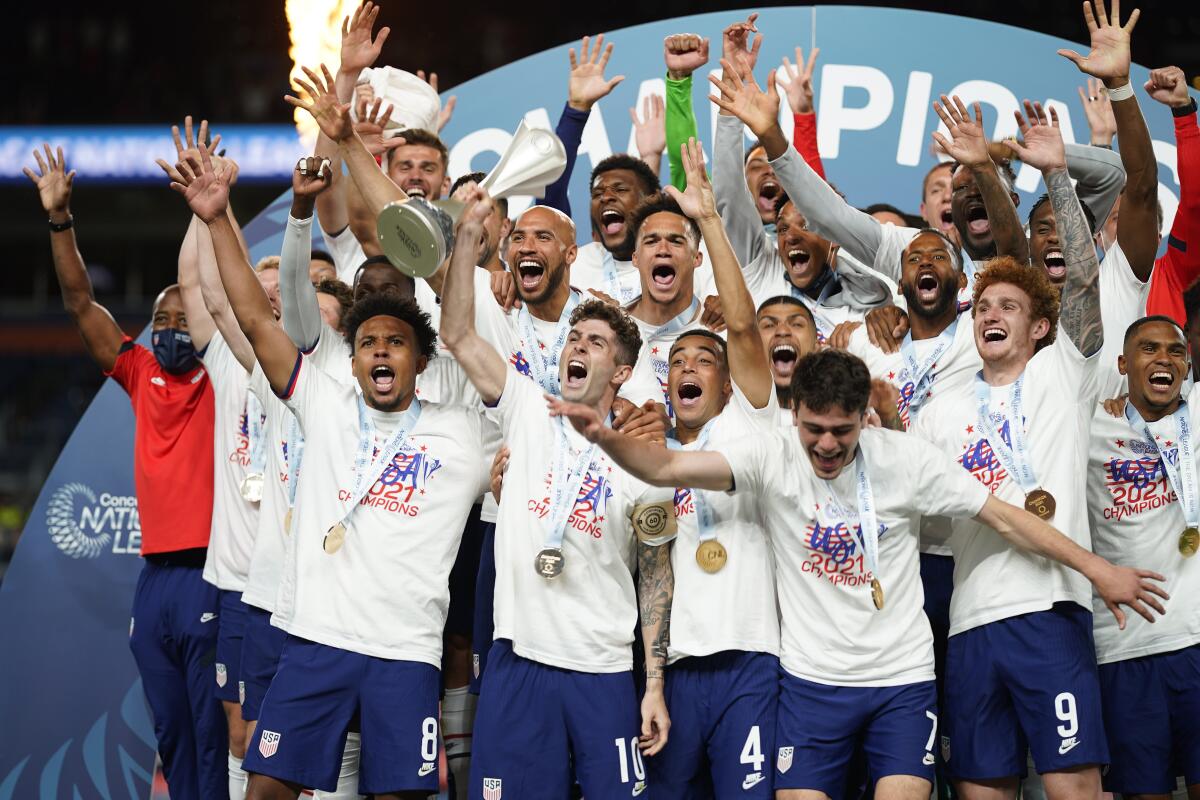
- Share via
Hello, and welcome to the L.A. Times soccer newsletter. I’m Kevin Baxter, The Times’ soccer writer, and we begin today with Sunday night’s CONCACAF Nations League final, which provided another chapter in the storied U.S.-Mexico rivalry.
It was an epic game that had a little bit of everything — and not all of that was good. We’ll get to the truly distributing stuff in a minute, but let’s start by focusing on the positive because the Americans’ 3-2 extra-time win could mark a turning point in one of the more hard-fought rivalries in international soccer.
The United States displayed heart and determination, twice rallying from one-goal deficits to force extra time, where it won on a penalty-kick goal from its captain, Christian Pulisic. Mexico built big leads in possession and shots, but the U.S. suffered through more than 130 minutes to truly earn the victory.
When they could have packed it in, they grinded it out. When they could have pointed to their blue-blood pedigree playing for big clubs in Europe, they turned blue collar, scratching, clawing and fighting for the crest on the front of their shirts.
How the U.S. won was just as important as that it won.
The Americans lost their starting goalkeeper, Zack Steffen, to a knee injury in the 69th minute but got a game-saving performance from backup Ethan Horvath. In the final minute of regulation, Horvath pushed Hirving Lozano’s curling shot from the top of the penalty area wide. Then deep in the second overtime, he dove to this right to block an Andres Guardado penalty-kick try to preserve the win and give Gregg Berhalter his first trophy as coach of the national team.
The U.S. was on the back foot from the start. But it never lost its balance.
A goal by Jesus Corona 65 seconds into the game put Mexico ahead, and only a VAR ruling, which erased a second goal midway through the first half, kept it from getting worse. However, the U.S. responded, tying the score in the 27th minute on a goal by Gio Reyna.
When Diego Lainez put Mexico back in front in the 79th minute, a minute after coming off the bench, Weston McKennie needed just four minutes to pull the U.S. even again.
The roster Berhalter has gathered is undoubtedly the brightest collection of young talent in national team history, including 10 players who won titles with their respective club teams in Europe and one, Pulisic, who became the first American to play in and win a Champions League final.
The starting 11 Berhalter selected from that roster Sunday was the youngest ever to start a tournament final for the U.S., averaging 24 years 206 days.
But neither talent nor youth is generally enough to survive in CONCACAF, where games can quickly dissolve into street fights — as Sunday’s did, both on and off the field. How the young Americans responded to those challenges — with Pulisic going so far as to pull off his shirt and taunt the Mexican fans by placing an index finger to his lips after his game-winning goals — showed this team might be able to stand up to the pressure of playing World Cup qualifiers in raucous places such as Mexico City’s Estadio Azteca.
“The only way you can get comfortable in that environment is with experience at it ... and realizing and feeling the pressure involved,” Landon Donovan, who engaged in some memorable battles with Mexico during his national team career, said before the game. “That’s just the reality. We don’t have enough guys right now who have been through enough of those experiences to confidently go into a place like Azteca and say they’re going to win the game every time.”
They do now.
Mexico’s veteran team did everything it could to disrupt the Americans — and none of it worked.
Mexican coach Tata Martino drew a red card deep in extra time, and Hector Herrera should been given one for his reckless play. But the Americans didn’t back down, committing 18 fouls and drawing five cautions of their own.
Reyna, a teenager who has already played in 10 Champions League games, not only scored the first U.S. goal but also assisted on the second one by McKennie, who played last season with Cristiano Ronaldo at Juventus.
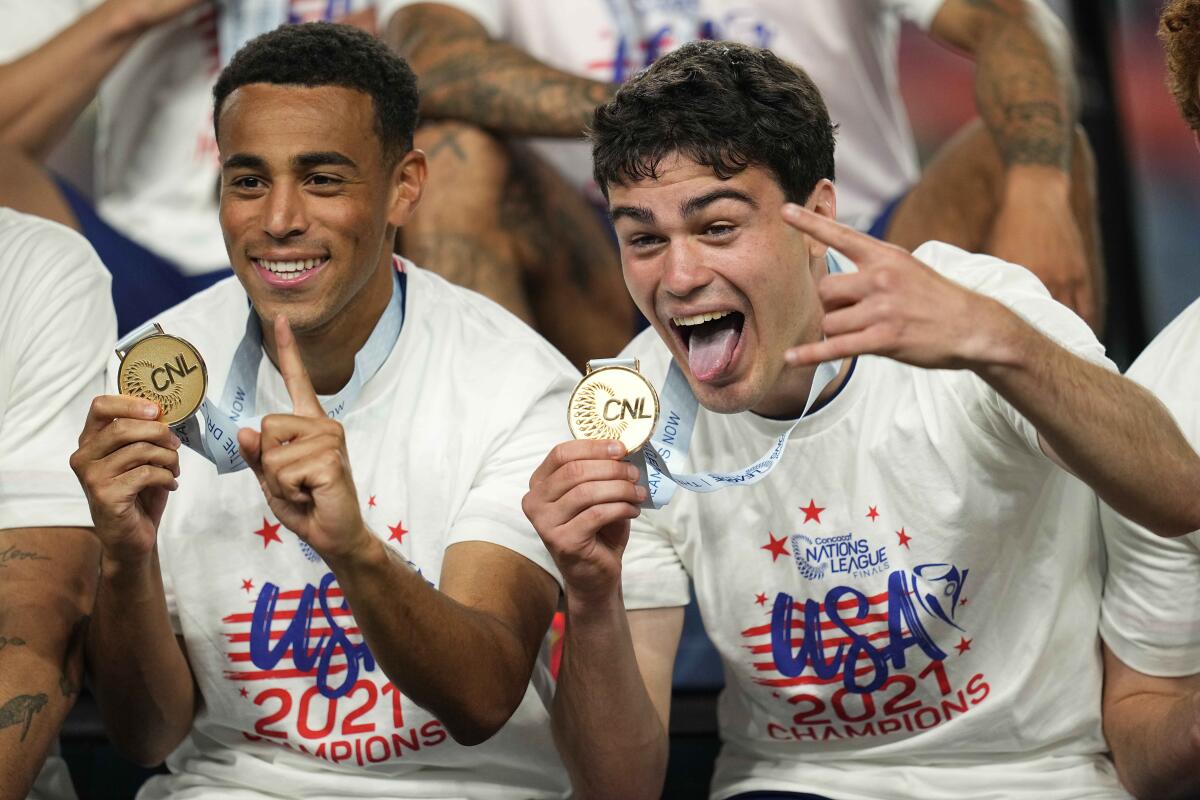
“At no point in our sport’s very short history have we had the type of player — the type of age and the type of team — come together like this,” said former national team player Herculez Gomez. “You are seeing very young players play on teams where Lionel Messi plays. Where Cristiano Ronaldo plays. Some of the best teams in the world, coached by some of the best coaches in the world.
“Never have we ever seen that.”
To that youth and talent you can now add grit and determination after watching the Americans go toe-to-toe with an experienced and wily Mexican team Sunday, beating it for just the second time in nearly six years.
Mexico is ranked 11th in the world, and while its roster is aging, Sunday’s loss was just the third in 26 games under Martino and the second since September 2019. The young Americans showed Sunday they’re not impressed. Or at least not intimidated.
The U.S. and Mexico will likely meet again in July’s Gold Cup final, when both figure to be playing a “B” team. So circle Nov. 12 on your calendar; that’s when the countries play in the first of two World Cup qualifiers.
“That will be the ultimate test,” Donovan said. “That’s where everyone’s measured. I think there’s enough quality [in the U.S.] and probably enough shared experiences that they can grind through qualifying and then have a successful World Cup.
“But obviously that remains to be seen.”
Behave yourself
The behavior of the coronavirus-limited crowd of 37,648 at Sunday’s Nations League final in Denver was deplorable and dangerous — ranging from an offensive chant and objects being thrown on the field, injuring Reyna, to a pitch invader storming the field late in the match.
These actions cannot be allowed to continue if soccer is to grow into a mainstream sport in the U.S. and not into some stadium-sized version of “Fight Club.” It’s well beyond time to enact and enforce serious zero-tolerance measures to curb this kind of behavior.
Buying a ticket doesn’t give anyone carte blanche to be a dangerous and offensive jerk. It should be considered a privilege and not a right, and if it means fans have to register to buy tickets, that seems like a small hassle to make stadiums safe for all fans and players. FIFA used similar measures during the last World Cup in Russia, and they appeared to work fine.
Sunday’s problems started with many in attendance continuing to use an anti-gay chant whenever Steffen or Horvath attempted a goal kick. FIFA, CONCACAF and the Mexican soccer federation have, at various times in recent years, undertaken measures to try to eliminate the offensive chant, but none have succeeded — partially because the penalties are not being enforced.
The Mexican federation pretended to be serious this time, promising to follow a graduated three-step procedure that could lead to fans being ejected and/or the referee ordering the match to be abandoned.
“This time is different,” said Yon de Luisa, president of the Mexican federation. “This time the sanctions are for real.”
Uh, no they’re not.
Sunday’s Nations League final was Mexico’s third match in the U.S. in nine days, and all three were marred by the chant, which also has stained MLS games in recent seasons. Some fans reportedly were ejected at some of those Mexican games, but the most serious interruption came late in Sunday’s final when Panamanian referee John Pitti halted play for three minutes as players on both sides pleaded for the crowd to behave.
It didn’t.
Less than a half-hour later, when the U.S. was celebrating Pulisic’s game-winning penalty kick, fans pelted the team with cups, water bottles and worse, with one of the objects striking Reyna in the head.
Reyna stayed down for several minutes before walking off the field with trainers. Then just before the final whistle a fan delayed play again by running onto the field.
“Total lack of respect for what’s happening on the field and all effort that both teams are putting into the game,” Berhalter, the U.S. manager, told the media.
Of Reyna he added: “I think he’s going to be OK, but he did take something to the head, and it could have been a lot worse.’’
There are disagreements over the intent and meaning of the anti-gay Spanish-language chant, with some translating it as a slur and others saying it’s a harmless taunt.
Those arguments are immaterial. A sizable portion of the population — both inside and outside soccer — is offended by the chant and FIFA has said it must stop. We don’t all agree that driving 65 mph is the safest speed limit, but you can get a ticket if you violate that law regardless of your personal opinion.
It’s the same with the chant. It’s prohibited, and we need to enforce that prohibition.

Members of Pasión 1927, a Los Angeles-based fan group of the Mexican national soccer team, share their thoughts on a popular chant that is widely considered homophobic.
There is far less debate about the other actions at Sunday’s game. No one in their right mind would argue players should be targets for angry fans. Or that the playing field should be anything other than a safe zone where players are free to compete without fear of either having their space invaded or having dangerous projectiles thrown into it.
So what to do? In England, where violent hooligans once turned soccer games into full-scale brawls, politicians got involved and enacted several measures to impede or prevent unruly behavior.
Not all of the measures were successful, but the additional focus on the problem helped. During a 2012 game at Manchester City, a fan threw a coin from the stands and struck Manchester United’s Rio Ferdinand on the head while he was celebrating a game-winning goal. Police used CCTV video from cameras placed throughout the stadium in an effort to identify the fan — and more recently similar security footage was used to identify and eject fans for using racist taunts or throwing other objects on the field.
The increased vigilance and the seriousness of the penalties meted out to offenders hasn’t totally cured English soccer, but it’s helped.
In Germany, fans have taken the lead. When the stands at Bayern Munich were invaded by skinheads and fascist sympathizers, one of the team’s largest supporter groups took it upon itself to create an atmosphere in which those fans did not feel welcomed — and it worked. In the largest stadium in the city that gave rise to the Nazis, fascism no longer is a problem.
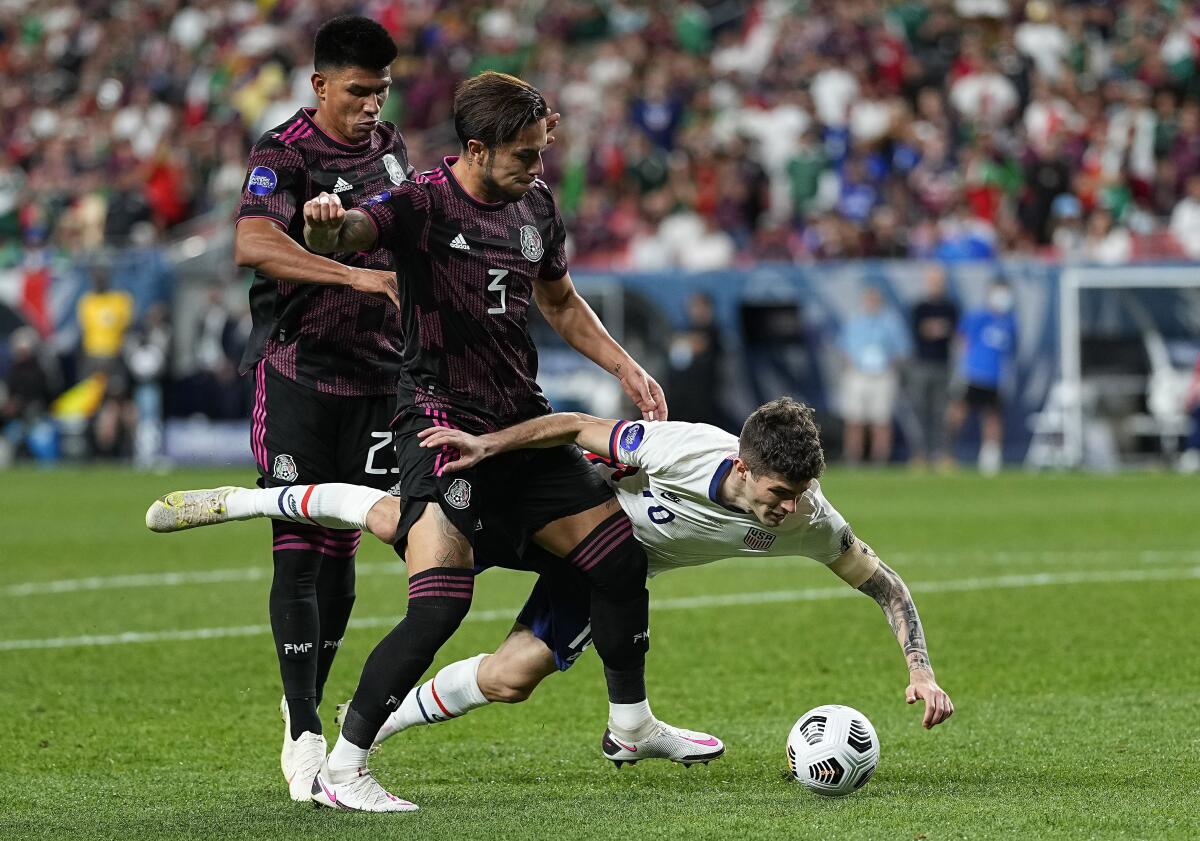
We need similar civic-spectator cooperation here. Fans cannot passively complain about unruly, offensive and sometimes dangerous behavior but not help groups like FIFA and the Mexican federation in their efforts to counter it. And politicians and other stakeholders cannot pass the buck and act like it’s not their concern. Such actions would be tolerated in a public park or library and should not be tolerated in a stadium either.
In Europe, the behavior of hooligans long kept families from attending matches and attendance suffered. Now attendance records are being shattered in England while the German Bundesliga trails only the NFL in terms of average attendance.
Riding the stadiums of the riff-raff has made the game better, safer and more popular in much of Europe. Allowing the behavior we witnessed at Sunday’s game to continue will seriously harm any chance the sport has to flourish here.
World vision
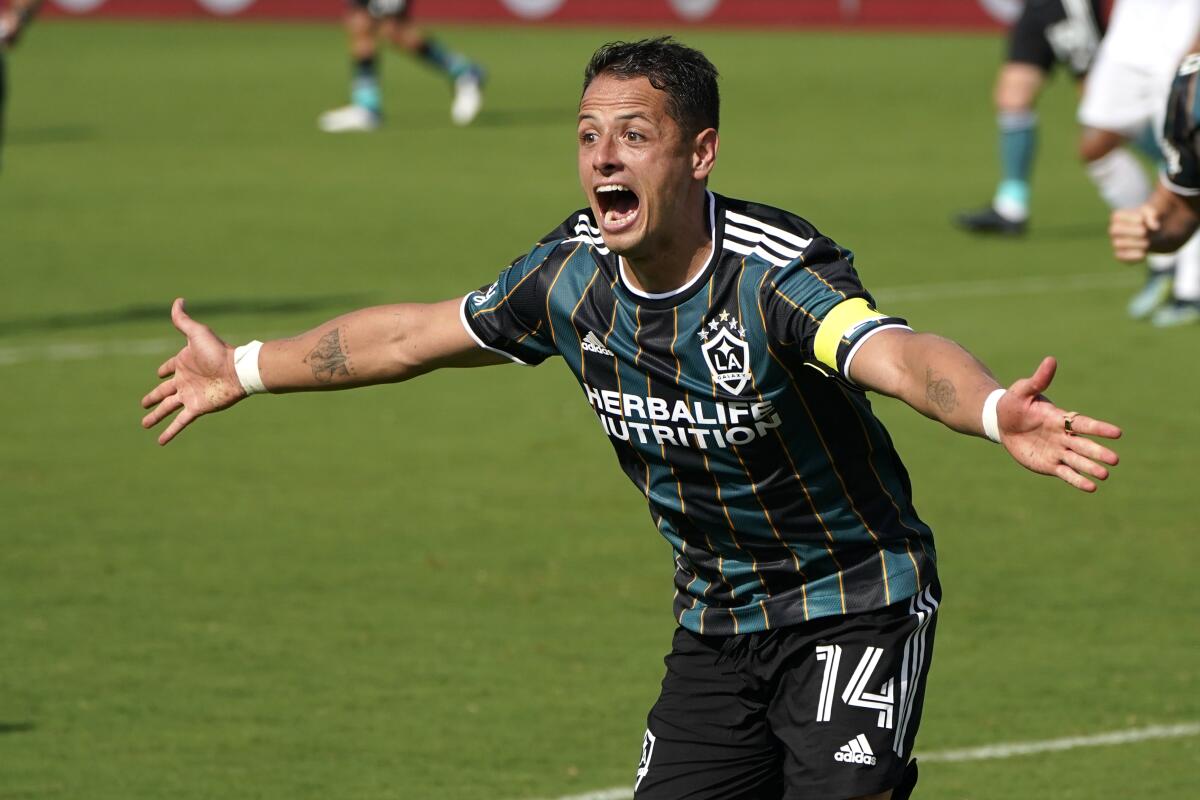
MLS rosters contain players from a record 76 countries this season, up four from last year. That makes it one of the world’s most diverse top-tier leagues in any sport, but it’s only the second-most-diverse league in North American because the 43 teams in the second-division USL Championship boasts players from 82 nations.
According to the league, 79 USL Championship players have represented their senior national teams, including more than 20 this past March in CONCACAF 2022 FIFA World Cup qualifying.
Italy’s Serie A is the most diverse of Europe’s “Big 5” leagues, with 65 countries represented on its rosters. However, Serie A has just 20 teams, seven fewer than MLS and 23 fewer than the USL Championship.
Last season, when MLS had 26 teams, 48.9% of the league’s 754 players came from the U.S. and Canada. An MLS official said the percentage of domestic players this season is expected to be about the same given the addition of an expansion club in Austin.
And finally there’s this …
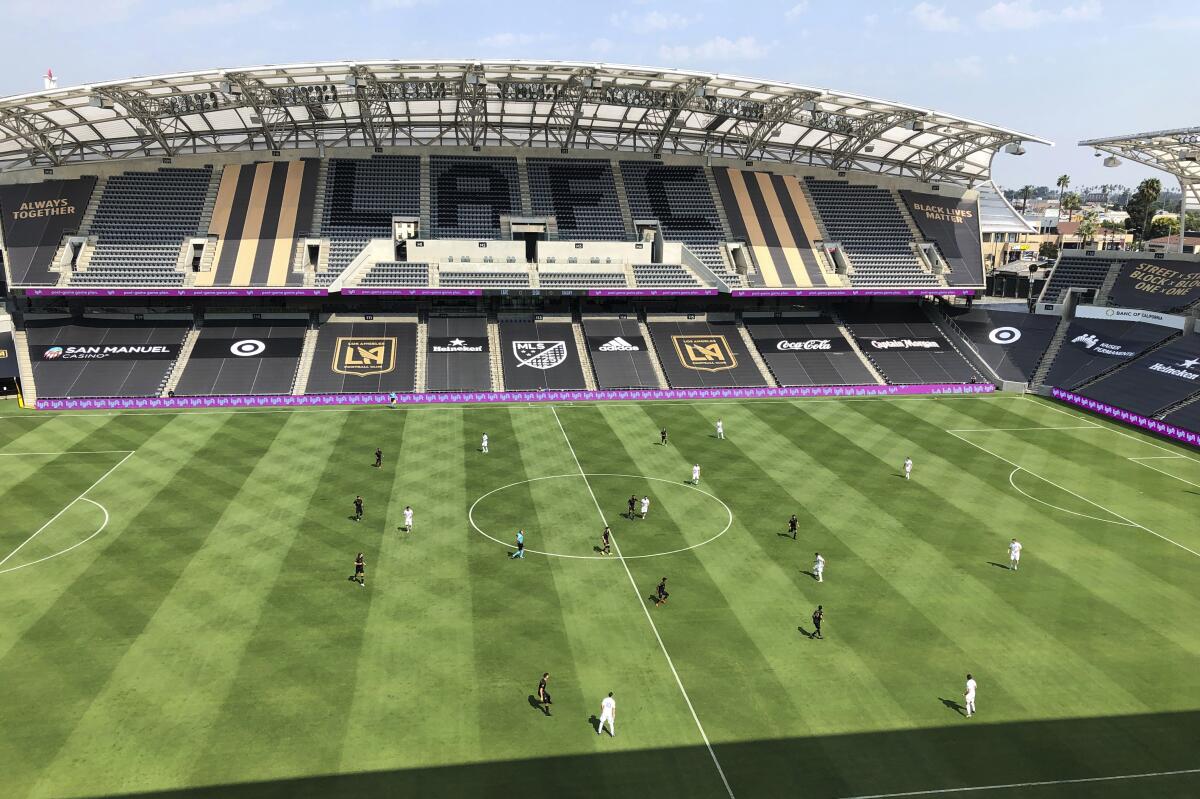
MLS will announce Wednesday morning that it’s annual all-star game will be played Aug. 25 at Banc of California Stadium and feature a team of MLS players facing Mexico’s Liga MX all-stars, a league source told the Los Angeles Times. The game, under the same format, was originally scheduled to be played in Los Angeles last July but was canceled by COVID-19. ... Speaking of which, if you think the coronavirus is gone, you might want to think again. The European Championships, delayed a year by COVID-19, is still being harassed by the virus on the eve of its delayed resumption with the Spanish team in isolation after Sergio Busquets tested positive. Spain is scheduled to face Sweden in its opener Monday; the month-long tournament kick offs with Turkey-Italy on Friday. ... According to a study of social media following and Google Trends searches conducted by English bookmaker William Hill, Manchester United and Liverpool are the two most popular Premier League teams in the U.S. The EPL is broadcast in 188 countries worldwide, making games available to more than 3.2 billion viewers
Quotebook
“We needed everyone today, and it was a phenomenal performance. We’re so proud and we still have a long way to go, but we’re happy with this.”
U.S. captain Christian Pulisic, who scored the winning goal in Sunday’s 3-2 Nations League win over Mexico
Until next time...
Stay tuned for future newsletters. Subscribe here, and I’ll come right to your inbox. Something else you’d like to see? Email me. Or follow me on Twitter: @kbaxter11.
Go beyond the scoreboard
Get the latest on L.A.'s teams in the daily Sports Report newsletter.
You may occasionally receive promotional content from the Los Angeles Times.




